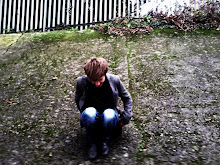I've had, for about as long as I can remember (And I can pin-point when, come to think of it; I'd just tottered in out of the rain on a fog-bound October day, where I'd been lurking in my den (A mossy alcove behind the log-pile my Dad built, clumping about in his work boots with a liberated - and lethally sharp - hatchet, clomping about like the wild man of the woods in size twelves) and was soaked through, covered in bark shreds, mulch, churned mud, lichen-dew, livid weals of crayola etc, when I found a green cloth-bound book, which turned out to be a Seamus Heaney anthology. I went to my secondary den place (behind a heavy velvet curtain; crushed, red, mothy), something of an obsession with Seamus Heaney's poetry. The first time I read this strange, bog poetry, which felt oddly as if the outside had been transmogrified into words (all the caked mud and leaf rot and squashed wood-worm on my boots and mackintosh, condensed, raw and cold and damp, into words), it was uncomfortably visceral. You could feel the hoar frost misting on your skin and flaking off in shards of rime; feel the spring and hear the hiss of air bubbles trapped in the springy lichen. Being behind a curtain with a glass of overproof Ribena and a monstorous, blue-furred spider of a hot water bottle didn't help much; it was still like being on the red moors and wracked dunes with a salt atlantic wind grazing your cheeks.
Anyway, it left me with a slightly uncomfortable shiver, hooked in and around my spinal cord; I kept getting petrified bog-men and slanted silver rain and deathly famines in my dreams. I carried on reading naturalist writing for the rest of my life; Roger Deakin, Ted Hughes, Gerard Manley Hopkins, E.M Forster, Thomas Hardy, John Muir, Henry David Thoreau, Adam Nicholson, Robert MacFarlane, and so on (I will write this up at some point, promise). Regardless, if the unthinkable has happened and you're not aware of Seamus Heaney, here's some of my personal favourites, bar the whole work of District & Circle, which I couldn't find illictly on-line and quaked a bit at the thought of typing up from scratch.
Seamus Heaney is, as far as I've discovered at any rate, the most sensitive, even-handed, elegant, languid, calm, and above all - this is what makes it work, I think - the least showy/understated poet I know of; adjectives are a killer sometimes. However, here they are, in no order that I'm aware of.
Lovers On Aran
The timeless waves, bright, sifting, broken glass,
Came dazzling around, into the rocks,
Came glinting, sifting from the Americas
To posess Aran. Or did Aran rush
to throw wide arms of rock around a tide
That yielded with an ebb, with a soft crash?
Did sea define the land or land the sea?
Each drew new meaning from the waves' collision.
Sea broke on land to full identity.
Strange Fruit
Here is the girl's head like an exhumed gourd.
Oval-faced, prune-skinned, prune-stones for teeth.
They unswaddled the wet fern of her hair
And made an exhibition of its coil,
Let the air at her leathery beauty.
Pash of tallow, perishable treasure:
Her broken nose is dark as a turf clod,
Her eyeholes blank as pools in the old workings.
Diodorus Siculus confessed
His gradual ease with the likes of this:
Murdered, forgotten, nameless, terrible
Beheaded girl, outstaring axe
And beatification, outstaring
What had begun to feel like reverence.
Death Of A Naturalist
All year the flax-dam festered in the heart
Of the townland; green and heavy headed
Flax had rotted there, weighted down by huge sods.
Daily it sweltered in the punishing sun.
Bubbles gargled delicately, bluebottles
Wove a strong gauze of sound around the smell.
There were dragon-flies, spotted butterflies,
But best of all was the warm thick slobber
Of frogspawn that grew like clotted water
In the shade of the banks. Here, every spring
I would fill jampotfuls of the jellied
Specks to range on window-sills at home,
On shelves at school, and wait and watch until
The fattening dots burst into nimble-
Swimming tadpoles. Miss Walls would tell us how
The daddy frog was called a bullfrog
And how he croaked and how the mammy frog
Laid hundreds of little eggs and this was
Frogspawn. You could tell the weather by frogs too
For they were yellow in the sun and brown
In rain.
Then one hot day when fields were rank
With cowdung in the grass the angry frogs
Invaded the flax-dam; I ducked through hedges
To a coarse croaking that I had not heard
Before. The air was thick with a bass chorus.
Right down the dam gross-bellied frogs were cocked
On sods; their loose necks pulsed like sails. Some hopped:
The slap and plop were obscene threats. Some sat
Poised like mud grenades, their blunt heads farting.
I sickened, turned, and ran. The great slime kings
Were gathered there for vengeance and I knew
That if I dipped my hand the spawn would clutch it.
The Docker
There, in the corner, staring at his drink.
The cap juts like a gantry's crossbeam,
Cowling plated forehead and sledgehead jaw.
Speech is clamped in the lips' vice.
That fist would drop a hammer on a Catholic-
Oh yes, that kind of thing could start again;
The only Roman collar he tolerates
Smiles all round his sleek pint of porter.
Mosaic imperatives bang home like rivets;
God is a foreman with certain definite views
Who orders life in shifts of work and leisure.
A factory horn will blare the Resurrection.
He sits, strong and blunt as a Celtic cross,
Clearly used to silence and an armchair:
Tonight the wife and children will be quiet
At slammed door and smoker's cough in the hall.
Thursday, 15 July 2010
Subscribe to:
Post Comments (Atom)

No comments:
Post a Comment